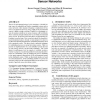Free Online Productivity Tools
i2Speak
i2Symbol
i2OCR
iTex2Img
iWeb2Print
iWeb2Shot
i2Type
iPdf2Split
iPdf2Merge
i2Bopomofo
i2Arabic
i2Style
i2Image
i2PDF
iLatex2Rtf
Sci2ools
172
click to vote
SIGMETRICS
2004
ACM
2004
ACM
Performance aware tasking for environmentally powered sensor networks
The use of environmental energy is now emerging as a feasible energy source for embedded and wireless computing systems such as sensor networks where manual recharging or replacement of batteries is not practical. However, energy supply from environmental sources is highly variable with time. Further, for a distributed system, the energy available at its various locations will be different. These variations strongly influence the way in which environmental energy is used. We present a harvesting theory for determining performance in such systems. First we present a model for characterizing environmental sources. Second, we state and prove two harvesting theorems that help determine the sustainable performance level from a particular source. This theory leads to practical techniques for scheduling processes in energy harvesting systems. Third, we present our implementation of a real embedded system that runs on solar energy and uses our harvesting techniques. The system adjusts its pe...
Related Content
| Added | 30 Jun 2010 |
| Updated | 30 Jun 2010 |
| Type | Conference |
| Year | 2004 |
| Where | SIGMETRICS |
| Authors | Aman Kansal, Dunny Potter, Mani B. Srivastava |
Comments (0)

